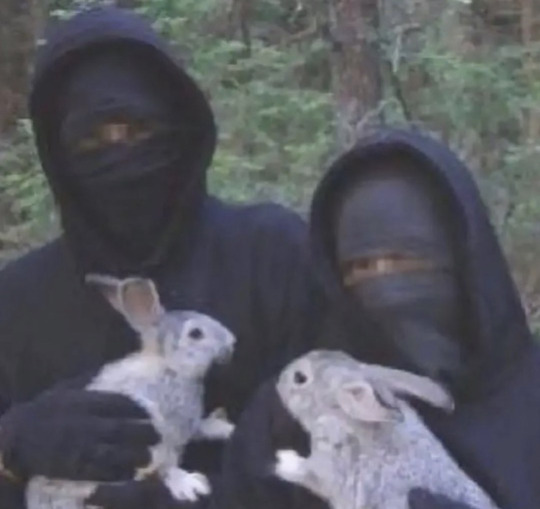#animal liberation
Text
"Animals do not ‘give’ their life to us, as the sugar-coated lie would have it. No, we take their lives. They struggle and fight to the last breath, just as we would do if we were in their place."
– John Robbins
107 notes
·
View notes
Text
"A telling example of the impulse to project human stereotypes of disability onto other animals can be found in the story of Mozu, a snow monkey (a Japanese macaque) who was born in Japan’s central highlands. Mozu was born with abnormalities of her hands and feet thought to have resulted from pesticide pollution. Snow monkeys spend much of their time moving through trees, which allows them to avoid wading through the thick snow that covers the ground in the winter months. Mozu’s disabilities meant she was mostly unable to move through the branches; instead she traveled the nearly two miles that her troop covered every day in search of food by alternately walking on her abnormal limbs and crawling and sliding on the forest floor. When Mozu was born, researchers who had been watching this troop feared she would not make it past infancy. To their surprise, Mozu lived for nearly three decades, rearing five children of her own and becoming a prominent troop member.
In an episode of the program Nature featuring Mozu’s story, she is again and again referred to as “inspiring,” “suffering,” and a “very special monkey.” The dramatic music and voice-overs that describe Mozu’s struggle in vivid detail make it nearly impossible to watch her move across the snowy forest floor, a baby clinging to her belly and other monkeys flying by above her, without thinking, “Poor Mozu!”
At the same time, I am aware that the piece was edited to elicit this reaction. There are few shots in which Mozu is not struggling, and I question the effect the videographers had on her and the troop. In one scene her desperation seems to stem from being chased by the cameraperson. The music and voice-overs of course also add a sense of struggle to Mozu’s story.
Yet I have no doubt that life was hard for Mozu, and I find myself desperate to know what she thought of her situation. Was her instinct to reach for the trees unquenchable? Was she always in pain, exhausted, or fearful as she moved slowly across the forest floor? Did she wonder why she was different from her companions? I cannot help but wonder, although I realize how similar these thoughts are to the tiresome questions I have been asked again and again about my own life, my own disability. My desire for Mozu’s life not to be seen as one of suffering and struggle is also a projection, one that wishes disability empowerment onto my fellow primate. Our human perspective shapes how we interpret Mozu’s experience.
Many of our ideas about animals are formed by our assumption that only the “fittest” animals survive, which negates the value and even the naturalness of such experiences as vulnerability, weakness, and interdependence. When disabilities occur, we assume that “nature will run her course,” that the natural process for a disabled animal is to die, rendering living disabled animals not only aberrant but unnatural."
-- Sunaura Taylor, "Animal crips" in Disability and Animality: Crip perspectives in Critical Animal Studies.
2K notes
·
View notes
Text
"Most people don’t think about the fact they’re eating animals. When they’re eating a steak or eating chicken, most people don’t think about the tremendous suffering that those animals endure simply to become food products to be consumed by human beings.
I think the lack of critical engagement with the food that we eat demonstrates the extent to which the commodity-form has become the primary way in which we perceive the world. We don’t go further than what Marx called the exchange value of the actual object. We don’t think about the relations that the object embodies, and were important to the production of that object. Whether it’s our food or our clothes or our iPads. That would really be revolutionary, to develop a habit of imagining the human relations and non-human relations behind all of the objects that constitute our environment.
The food we eat masks so much cruelty. The fact that we can sit down and eat a piece of chicken without thinking about the horrendous conditions under which chickens are industrially bred in this country is a sign of the dangers of capitalism, how capitalism has colonized our minds. The fact that we look no further than the commodity itself, the fact that we refuse to understand the relationships that underlie the commodities that we use on a daily basis.
I think there is a connection between the way we treat animals and the way we treat people who are at the bottom of the hierarchy. Look at the ways in which people who commit such violence on other human beings have often learned how to enjoy that by enacting violence on animals. So there are a lot of ways we can talk about this."
-Angela Davis
293 notes
·
View notes
Text
what the "there is nothing morally wrong with eating animals" line of thought fails to address is that even while animals can be a source of food, they do not exist to be a source of food. this is the misconception we need to decondition ourselves from.
no, there is no moral quandary to be found in sustaining yourself with what food is available to you. this is how every living being in nature functions. that's not a point of debate.
but no one looks to a deer and says, "this animal exists to be food for the lion." we understand that it has a life of its own; a multitude of connections to its environment and many relationships within its herd, countless age-old instincts stored deep within its body, and at its core, an innate, passionate drive for survival. we can observe and admire them for what they are, outside of the context of their relationship to their predators.
in fact, many of us might struggle to sit through a nature documentary in which we are forced to watch a defenseless baby deer be chased down and ripped apart by a pack of lions, even though we fundamentally understand that it is a tragic necessity and bears no moral weight on either animal. in general, we tend to be empathetically attuned to a wide variety of animal experiences, regardless of how they relate to each other in the web of sustenence.
so then why do we feel enabled to select a specific group of animals that we have deemed our objective "food sources" (cows, pigs, chickens, fish), separate them from the animals we consider worthy of protection or companionship, deny them any life outside of being born into a captive, human-run farm setting where they cannot live out their natural instincts and stand no chance of ever even being able to fight for their survival, detach ourselves from any acknowledgement of their lives or existence outside of their processed bodies in our stores and on our plates, and then strive to morally justify this relationship?
fundamentally, the functions of nature and animal agriculture are not comparable, and therefore our collective moral understanding of the concept of animal sustenance is situationally irrelevant, inaccurate, and cannot be applied to it.
264 notes
·
View notes
Text
Can’t be vegan? Go vegetarian.
Can’t be vegetarian? Do meatless Mondays.
Trying your hardest (whatever that may be) to help animals and the environment is far better than sitting on the sidelines and watching it burn.
#vegan#vegetarian#meatless Monday#animal rights#animal liberation#environment#environmentalism#climate change#animal welfare#animal cruelty#veganism#save the planet#climate action#climate crisis#global warming#climate#ecology#recycling#sustainability#sustainable#go vegan#veganuary#plant based
200 notes
·
View notes
Text
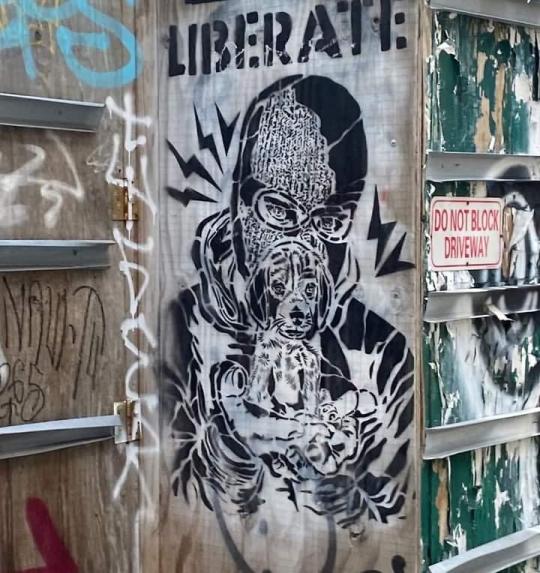
Animal liberation stencil spotted in NYC
168 notes
·
View notes
Text
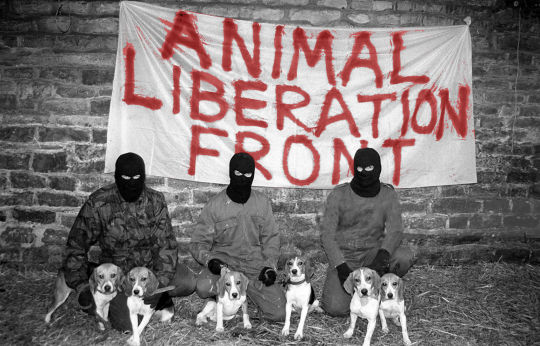


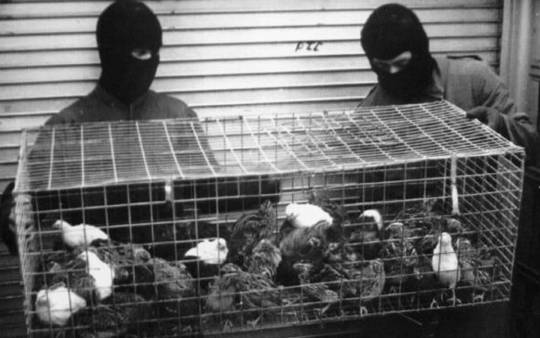
Animal Liberation Front
251 notes
·
View notes
Text
‘When scientists like me advocate for healthy and environmentally-friendly eating, it’s often said we’re sitting in our ivory towers promoting something financially out of reach for most people. This study shows it’s quite the opposite. These diets could be better for your bank balance as well as for your health and...the planet.’
Oxford University research has today revealed that, in countries such as the US, the UK, Australia and across Western Europe, adopting a vegan, vegetarian, or flexitarian diet could slash your food bill by up to one-third.
🌱 🌼 ✨ 🌱 🌼 ✨ 🌱 🌼 ✨
It found that in high-income countries:
Vegan diets were the most affordable and reduced food costs by up to one third.
Vegetarian diets were a close second.
Flexitarian diets with low amounts of meat and dairy reduced costs by 14%.
By contrast, pescatarian diets increased costs by up to 2%.
#txt#veganism#solarpunk#food centric herbalism#sustainability#vegan#plant based lifestyle#holistic leveling up#leveling up#environmentalism#animal liberation#animal exploitation#adulting#finances#that girl#green juice girl#glow up#mindful consumption#mindful living#mindfulness#consumerism#ethical consumption#yeahhhh I've never known anyone to find it more expensive. it really seems a huge misconception#earth stewardship#today i learned#sidewalkchemistry
221 notes
·
View notes
Text

libertas perfundet omnia luce
84 notes
·
View notes
Note
wait riding a horse is exploitation to you 😭 pls be fr. theres a dif between forcing your horse and harming them (which im not saying isnt common with equestrians honestly We need to put so many of those ppl down i stg) and riding them for fun or going on a trail or smth. riding your horse is not inherently anything, you dont have to! but its literally what we domesticated them for, its like saying working your border collie is exploitation. (horse racing, rodeo etc does not apply we need to kill people)
You freely admit that abuse is possibly common in the equestrian world, and in the next thought admit these people should be killed. But you seem shocked that I believe a system in which horse riding for pleasure is inherently exploitative. This confuses me a little.
Working my bordie collie for what, exactly? Herding sheep I plan to sell to slaughter? I'm not sure you want me to say here. I am against any system that exploits both humans and non-human animals. Saying they are "working" when they have no control over their lives nor do they have consent, whether or not they enjoy it, is not a system I wish to support.
"There's a difference between forcing your horse and harming them" That is exactly what breaking entails, forcing young horses to accept being ridden. It is force. We do not ask them politely, we force them to accept a rider until they no longer fight them off. A horse that does not accept being ridden is a horse with no monetary value, and is therefore useless to the market. How long do you think such horses last before being put down?
In terms of domestication, horses did not willingly submit to being used by humans. Do you freely admit this as well? When we captured them and rid them, did they simply comply? Or did they buck and struggle and fight to get away? Just because we have historically used them for a purpose does not mean we should keep doing so. Part of growing up is learning the behaviors you do that are harmful, and choosing to change them. We do this individually and on a societal level, and we look at this as progress.
There is nothing wrong with reevaluating our relationship with animals, and realizing in most cases, it is entirely one-sided. Which is not, inherently, a relationship at all. It is exploitation.
Adopting a horse to care for them, giving them space to exercise and socialize, is not exploitation. Buying a horse to ride for pleasure is, and always will be, an inherently exploitative system. Because every step along the way was a human forcing a horse to obey.
158 notes
·
View notes
Text
"Crop deaths this!" "crop deaths that!"
Omg when will people stop acting like every loaf of bread you buy has the ghosts of 3 field mice attached to it?
87 notes
·
View notes
Photo

Safety, Not Slaughter 🌿🐓🐑🐄🐖
A drawing featuring residents of The Farm Animal Sanctuary - Victoria, Lily, Buster, Colin, and Gilbert ✏️
£5 from each sale of this print on my Etsy shop goes towards the sanctuary 💚
[shop here]
#vegan#vegan art#animal rights#animal liberation#go vegan#veganism#animal sanctuary#my art#illustration#drawing#art
366 notes
·
View notes
Text
people will breed their dogs and put them through entire pregnancies just to sell the puppies or "own" chickens to sell and/or eat the eggs that they lay and just expect everyone else to act like it's normal to exploit an animal's entire reproductive system for their own benefit/profit
167 notes
·
View notes
Text

Vegan Coffee Cake
#cake#cakes#sweet#dessert#desserts#coffee#coffee cake#vegan#veganism#vegan food#vegan recipe#home cooking#recipe#vegetarian#vegan recipes#veganrecipes#go vegan#what vegans eat#veganfood#vegan foodporn#animalrights#crueltyfree#cruelty free#animal rights#animal liberation#animal welfare
71 notes
·
View notes
Text
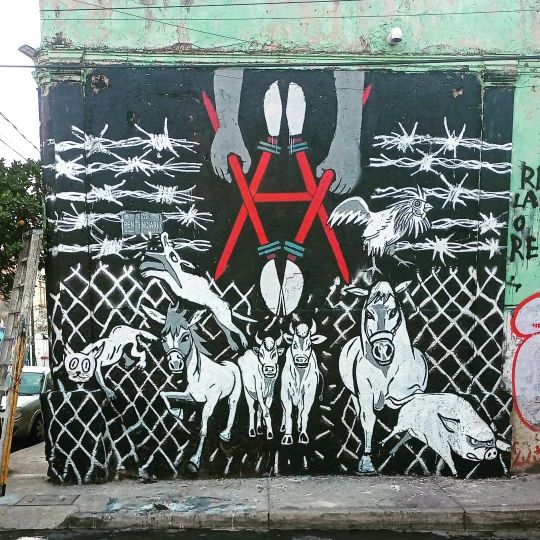
Animal Liberation mural in Guadalajara, Jalisco, Mexico
388 notes
·
View notes

